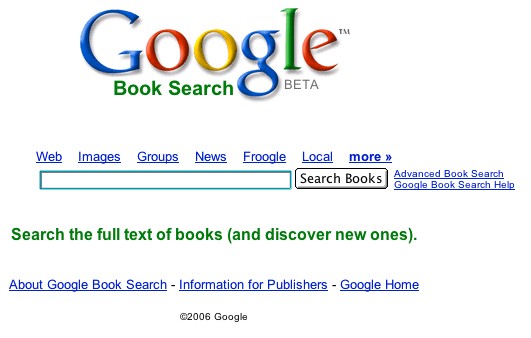Google Plans To "Sell" Books
- by Michael Stillman

Google plans to sell online access to books through its Google Book Search.
By Michael Stillman
Google took another step this past month to work its way into the world of books, and even more significantly, into the business of books. This is not the first such step, and we highly doubt it will be the last. Google appears determined to insert itself into this world that most of us who visit this site inhabit. The only question that remains is just how deeply and in what ways Google intends to become involved.
Last year we saw the development of the Google Print project. This involves the digitization of millions of old books from the collections of several important libraries. These records are placed into a database which can be searched in a manner similar to the way Google searches the internet. While a great many, probably the majority of these books have seen their copyrights expire, others are still protected. This resulted in much consternation on the part of some copyright holders, who were not satisfied by Google's pledges to show only snippets from their books, rather than the complete text. Nor were all satisfied with Google's willingness to point searchers to places where they could buy these texts. This debate shows no sign of abating, and meanwhile, Google plows ahead with its digitization project.
In November, Google took another step, more verbal than physical, but potentially very meaningful. They changed their program's name from the more scholarly sounding Google Print to the more active Google Book Search. We have heard that traffic has increased substantially since the name change, but are not able to verify this.
Now, Google has made a new offer to book publishers. The monster search engine has offered to put their books up online through Google Book Search and sell access to the text. Publishers could choose what books to make available (including newer ones), how much to charge, what type of access to provide, and whether the customer could print a copy of the book. Details of the program have not been spelled out, but it might work like this: customer finds a book through Google Book Search. They give Google their credit card number, and thereby receive access to view the book online, perhaps forever. The means for preventing others from piggybacking on that access is not spelled out, but perhaps the online text could only be seen if accessed through the customer's IP address.
No division of revenue has been stated, other than the majority will go to the publisher. One website stated the split would be 70-30, but we cannot confirm this. Nor do we know what, if any, credit card processing fee Google might charge, but those who have followed recent developments at Abebooks understand this can be a contentious issue.
This development certainly isn't going to be a threat to booksellers who deal in collectible works. We doubt that it will have much impact on those who buy used books for casual reading. However, it could have some impact on the fringes. Perhaps students who purchase used books as part of a school assignment will opt for online access instead, particularly if it is cheaper. Copyright holders of out-of-print books should welcome this program. Right now, they receive nothing from the resale of their old books. Now, they can once again sell their old books despite their being out of print. They will have a decided price advantage, since they do not have to charge shipping and handling, and have no associated costs. They can simply sell access, which costs them nothing, for less than the cost of shipping and have a guaranteed price advantage every time.
Stay tuned for further developments. We do not know what Google's long-term intentions are for the book trade. Perhaps they do not know yet either. What we do believe is their involvement will, in time, be quite substantial, and we will not be surprised if it touches the old and collectible trade as well.